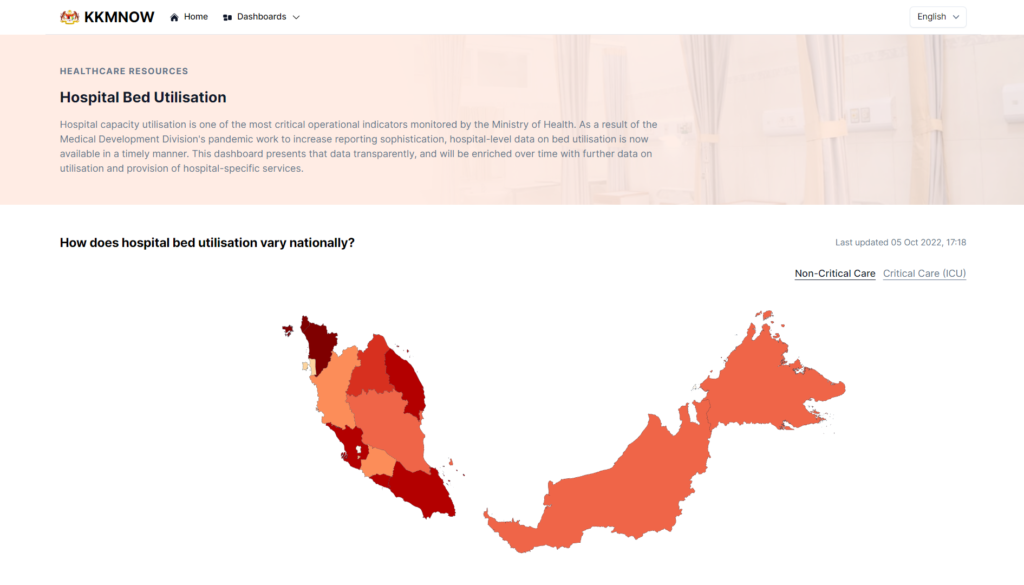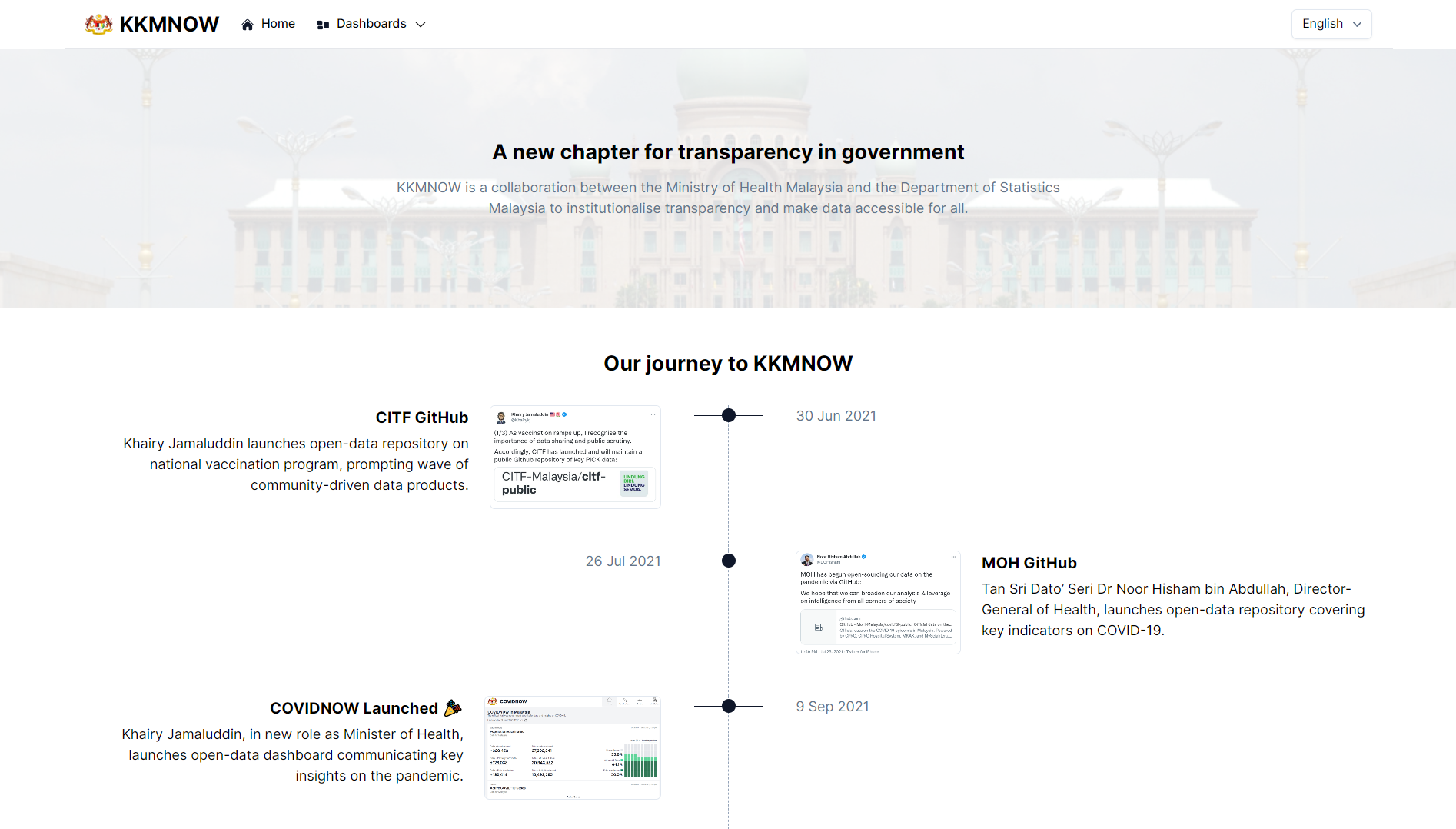KUALA LUMPUR, Oct 5 – Health Minister Khairy Jamaluddin today launched a new website that will contain a wealth of data on public health, including real-time data on bed utilisation rates at public hospitals, organ donor pledges and blood stock levels.
Building on the success of the CovidNow website, Khairy said the new KKMNow site will feature an array of new datasets that will cover morbidity and mortality rates, including on non-communicable diseases (NCDs), a breakdown of organ and blood donors by key demographics such as age and ethnicity, and ambulance response time.
“For the data geeks out there, the datasets we will be uploading onto KKMNow is completely unprecedented. There’ll be so many secondary applications, services that can be developed from the datasets that we are uploading today and over the next few weeks.
“In fact, we wanted it to be a slow drip reveal because if we reveal them all today, it will be drowned out by all the data. So every week we will reveal new data sets over the next few weeks,” Khairy said at the launch of the KKMNow site today.
The new government health website not only features dashboards on key data but offers open access to raw, granular data on GitHub.
“This is the first government website to have the back end and front end code open and I believe this should be normalised,” Khairy said.
Currently, the KKMNow site features Covid-19 data from the CovidNow site, a database on all public health care facilities in Malaysia, the hospital bed utilisation rate across all states, as well as data on several public health care programmes such as blood donation, organ donation pledges and Peka B40 health screenings.
Currently Available Data

Data on MOH’s hospital bed utilisation rates, which is sourced from the Crisis Preparedness and Response Centre (CPRC), will allow the government to monitor and inform the public of the situation on the ground.
According to the data uploaded today, six states have a hospital bed utilisation rate of over 80 per cent, with Perlis topping the list at 91.8 per cent. By hospitals, nine public health facilities had a bed utilisation rate of 100 per cent or more, with the highest in Hospital Seberang Jaya in Pulau Pinang at 110.8 per cent.
For blood donation, the data on KKMNow is historical and goes all the way back to October 5, 2019. “That’s how good the data in KKM is. That’s why I said we have mountains of data and now we are presenting it for the first time,” Khairy said.
The site currently displays blood donation trends and rates by date and state, using data obtained from the Blood Bank Information System v2 (BBISv2).
“In one or two weeks, the blood donation system will provide information on stock levels so we will know the stock level by blood type, by state. No longer will there be a need to have blood donation campaigns [to inform people about blood shortages], we will know what the stock level is,” Khairy said.
The KKMNow site also features trends on organ donation pledges, which also dates back to October 5, 2019. “If you look at daily pledges – why did it go up suddenly in September of this year? There’s a big spike. Can someone tell me why? MySejahtera. We introduced the organ donation pledge on MySejahtera and it shot up,” Khairy said.
“That’s the MySejahtera effect, and it keeps going up.”
In contrast, the Peka B40 screenings saw a massive decline in March 2020 due to movement restrictions introduced by the government to curb Covid-19 spread, and has remained below pre-pandemic levels.
“So now we’re struggling to get it back to pre-pandemic rates. Our present health screening level has not reached pre-pandemic level – that’s what the data is telling us,” Khairy said, adding that all data on KKMNow are anonymised.
Future Data On KKMNow
Khairy said the availability of granular data on the CovidNow website had positive spillover effects, enabling various parties, including the National Institutes of Health (NIH) to produce articles that are published in peer-reviewed journals.
Malaysia’s commitment to open data, via MOH’s CovidNow initiative, was also commended by Oxford University’s Our World in Data team, Khairy said.
In the coming weeks, the KKMNow website will feature new datasets including blood stock relative to safe levels, data on morbidity and mortality, data from the Malaysia National Health Accounts, findings from the National Health Morbidity Surveys, and an analysis of access to health care which tells people how far they are from the nearest clinic or hospital.
KKMNow will also feature a dashboard on government medicine stock, which Khairy described as a “game changer” initiative. “We recently had a shortage of paracetamol, cough syrups etc. We’re going to show that to the country, where our medicine stock is right now.”
The website will also feature waiting time for procedures, which will act as a key performance indicator (KPI) for MOH, Khairy said. Additionally, KKMNow will also have a dashboard on ambulance response time from MERS999.
“In the future, we hope to get data sets from other ministries who also contribute significantly to public health like road traffic accident data – if we can get this data from the Road Transport Department (JPJ) or the police, we can map it out.
“You just imagine, we can map out road accidents in Malaysia, the actual granular data. Match that with your blood bank information, you know why, because road traffic accidents require blood so we know exactly which hospitals to deploy the blood based on the real-time road traffic accident data. This is one example.
“Another example is data from the Department of Environment and the Meteorology Department on flood-risk mapping – we can get that now. We know that floods have public health implications, we can get our clinics ready, we can get the flood centres ready if we know the data in real time,” Khairy said.
“I’m convinced that this is the beginning of the institutionalising of transparency and making data accessible to all.”








